What the Alabama Supreme Court Decision Means for a Florida-Based PEOPLE Staffer with Frozen Embryos (Exclusive)
Amid the Alabama Supreme Court's ruling that frozen embryos will now legally be considered children in the state, a PEOPLE staffer shares her experience
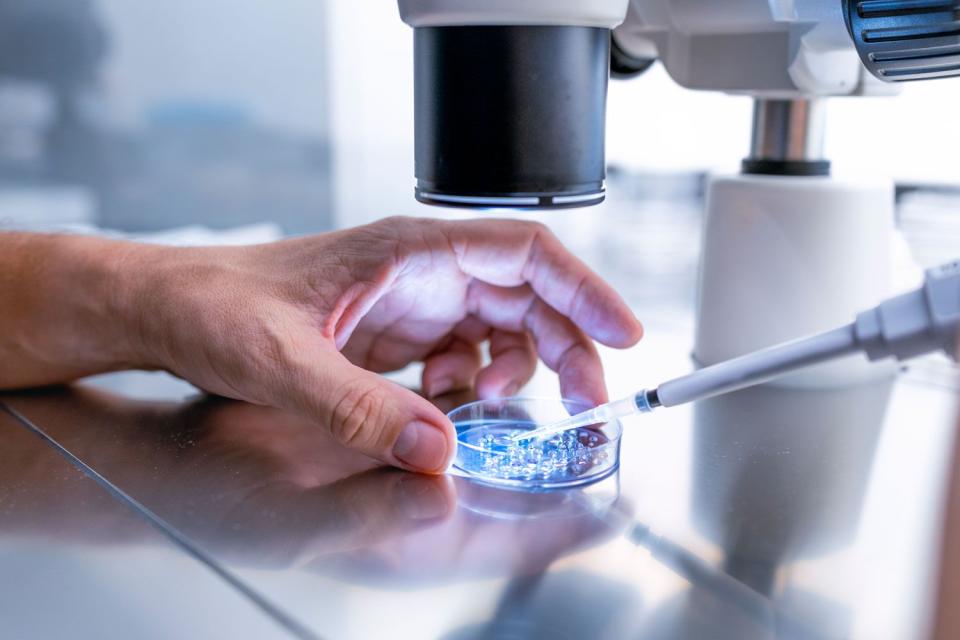
Getty
Doctor preparing embryo cultivation plates"Unfortunately, there are not any other options."
This was the brusque email reply I received on Wednesday from the company that is currently storing my seven remaining frozen embryos, created from the two rounds of in vitro fertilization I underwent in 2019 and 2020 due to unexplained infertility. Six of them are aneuploid — chromosomally abnormal and completely incompatible with life.
My urgency to send them an email in the first place came about in the wake of the Alabama Supreme Court's recent ruling that frozen embryos will now legally be considered children in the state. Florida — where I live — could easily be next.
The clinic's reply email was to my question about whether I could donate my six aneuploid embryos to research while saving my viable one — after being told that their "company policy does not allow partial discards."
My husband and I had chosen to keep all the embryos stored for the time being (including the nonviable ones) until we were ready to fully end our IVF journey in 2025. We'd been through so much to start our family and preferred to cross the discard-or-donate bridge when we came to it.
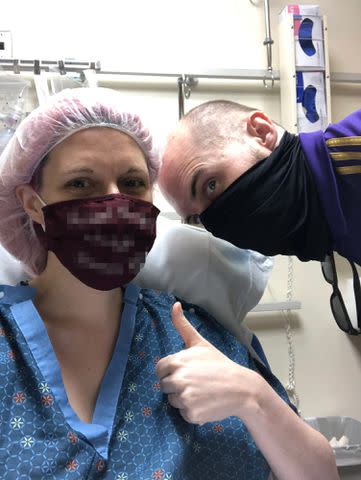
The clinic's response, in a nutshell: If you want to continue to manage your embryos through us, either transfer your healthy embryo now and destroy the abnormal ones, destroy the entire batch including the healthy one or just sit tight and risk potentially being tried as a criminal in the future.
What a decision.
The latter case is something I never thought in a million years would happen to me as someone who turned to IVF to start my family — not even when Roe v. Wade was overturned by the U.S. Supreme Court in June 2022 after nearly 50 years, effectively eliminating a pregnant person's constitutional right to an abortion in every state.
The more recent Alabama decision came as a result of a wrongful-death lawsuit brought by couples whose frozen embryos were destroyed at a fertility clinic in December 2020, when a patient entered a cryogenic nursery storage unit and removed several embryos. Per the Feb. 16 decision, unborn children are to legally be considered children "without exception based on developmental stage, physical location, or any other ancillary characteristics."
Never miss a story — sign up for PEOPLE's free daily newsletter to stay up-to-date on the best of what PEOPLE has to offer, from juicy celebrity news to compelling human-interest stories.
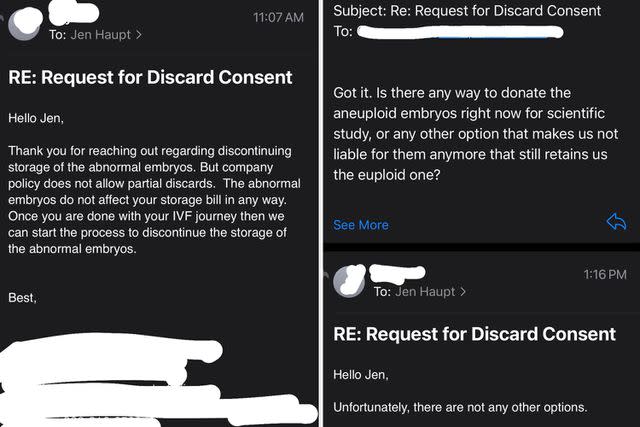
Jen Juneau
Jen Juneau's correspondence with embryo centerRelated: Why I Chose to Have a Medical Abortion — Twice — While Struggling with Infertility for Years
In a statement released Sunday in response, the American Society for Reproductive Medicine (ASRM) said they "condemn" the "profoundly misguided and dangerous court decision in Alabama."
"In its medically and scientifically unfounded decision, the court held that a fertilized frozen egg in a fertility clinic freezer should be treated as the legal equivalent of an existent child or a fetus gestating in a womb. The eight members of the court who approved this decision may view these things as the same, but science and everyday common sense tell us they are not," the group said.
After summarizing the science behind IVF, they added, in part, "By insisting that these very different biological entities are legally equivalent, the best state-of-the-art fertility care will be made unavailable to the people of Alabama. No healthcare provider will be willing to provide treatments if those treatments may lead to civil or criminal charges."
"The choice to build a family is a fundamental right for all Americans, regardless of where they live. We cannot, therefore, allow this dangerous precedent of judicial overreach with national implications to go unchecked," the ASRM's statement also read. "We call on the people of Alabama to demand that their elected officials ensure that Alabama’s citizens are not victims of political and ideological whims. To our members in the state: We will not rest until your ability to provide patients with the best care is restored.”
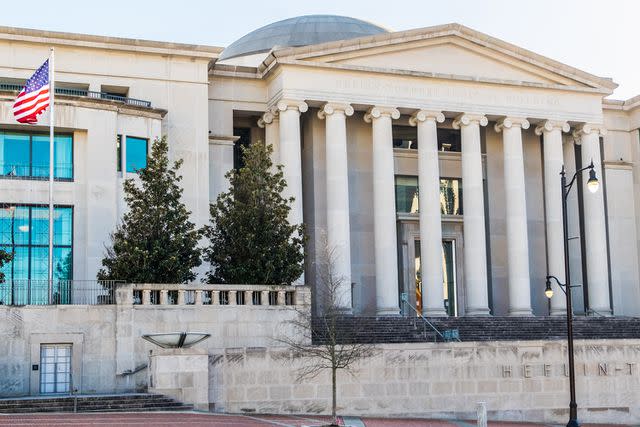
Getty
An exterior view of the Alabama Supreme Court buildingI spoke with Dr. Mark Trolice, a reproductive endocrinologist (REI) and founder/director of The IVF Center in Winter Park, Florida, about the Alabama Supreme Court's decision and what it could mean for the larger conversation around IVF and human rights.
"Infertility is a disease designated by the American Medical Association and the World Health Organization," says Dr. Trolice. "Impeding the treatment of a disease with proven effectiveness for nearly half a century, based on religious considerations and without medical or legal grounds, the Alabama ruling represents the unjustified withholding of reproductive care toward one in six people struggling to build a family."
Dr. Trolice — who has also written a book titled The Fertility Doctor's Guide to Overcoming Infertility (2020), faced a 10-year infertility battle in his own family and is on the board of several committees, including ASRM and the Society for Assisted Reproductive Technology (SART) — says potential consequences of the Alabama decision include "fueling the anti-abortion movement," "asserting control of women" and "turning embryo-cryopreservation tanks into frozen nurseries," the latter of which could require IVF patients to pay embryo-storage fees in perpetuity.
"Will frozen embryos compel child support following divorce? Will women and couples receive child tax credit based on frozen embryos, as they will be designated as unborn children?" he says.
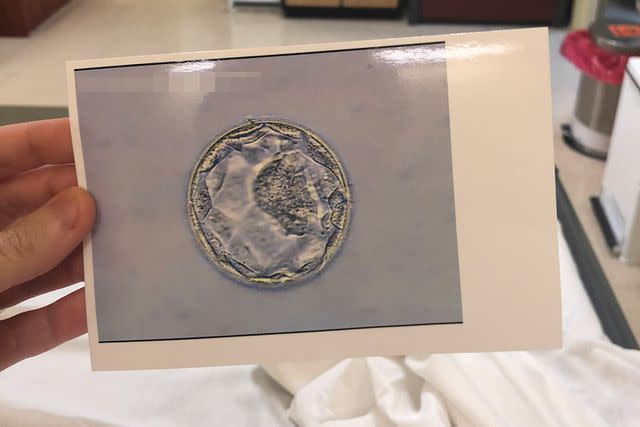
Related: Alabama Supreme Court Rules Frozen Embryos Are Children, Jeopardizing IVF Possibilities
Asked about advice he'd give patients who are considering IVF or already have embryos frozen, Dr. Trolice stresses that no relevant laws pertaining to IVF restrictions have been passed just yet and that catastrophizing might only add undue tension.
As he explains, "Infertility patients have enough anxiety and stress over their disease. So I think to fuel that with the possibilities are not fair to them. If something is not proven to come to fruition, why prepare and cause so much upset?"
"I think this is just prompting significant legal battles in an election year where there may be posturing or other motivations and we don't know how this is going to pan out, but right now it's a terrible turmoil in Alabama for the clinics and, most importantly, for the patients," Dr. Trolice adds.
As for my situation, my original REI (I have seen multiple) has given me the option to have my embryos transferred to their clinic, where they can do a partial discard. I may do this. I haven't decided, as I'd ideally like to stay with my current clinic, as it's where I finally achieved pregnancy after four long years of trying, which included a lot of invaluable trial-and-error with my first REI. But I do know I want to move forward with attempting to give my daughter a sibling.
I am one of many, many Americans who has struggled against not only legal rulings like this, but also a healthcare system that continually invalidates women's health. I can only hope that the future is less bleak, for the sake of my own daughter and would-be families everywhere.
For more People news, make sure to sign up for our newsletter!
Read the original article on People.

